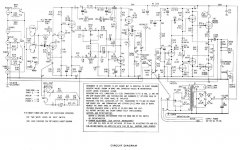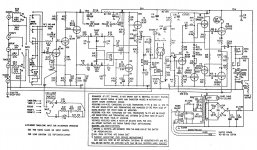I'm pretty blase about transistor substitution. Package the same, polarity the same, Vceo high enough, in it goes. Then I listen to see what happened.
The faster new transistor can oscillate in a circuit board designed for slow old 1970 transistors, but you have found a source of a 1970 transistor. You might put a heat sink on it, in case the later quad 303 transistor was tougher. Nobody was measuring SOA back then, to tell how tough transistors were (able to withstand high wattage applications). Hint- you'll have a lot easier time finding a heat sink for a TO126 or TO220 package than a heat sink for a TO5. My Leak 70 copy (sort of) , the dynaco ST120, had heat sinks on the TO5 driver transistors. The leak picture doesn't appear to have heat sinks, but then they were only putting out 35 watts/ch with a 70 v single rail. The ST120 had similar circuit design but was 60 w/ch. How many watts/ch is a Quad 303? that will tell you if you need driver heat sinks or not.
The faster new transistor can oscillate in a circuit board designed for slow old 1970 transistors, but you have found a source of a 1970 transistor. You might put a heat sink on it, in case the later quad 303 transistor was tougher. Nobody was measuring SOA back then, to tell how tough transistors were (able to withstand high wattage applications). Hint- you'll have a lot easier time finding a heat sink for a TO126 or TO220 package than a heat sink for a TO5. My Leak 70 copy (sort of) , the dynaco ST120, had heat sinks on the TO5 driver transistors. The leak picture doesn't appear to have heat sinks, but then they were only putting out 35 watts/ch with a 70 v single rail. The ST120 had similar circuit design but was 60 w/ch. How many watts/ch is a Quad 303? that will tell you if you need driver heat sinks or not.
As this thread is about the Stereo 70, I should add that I have one, also a Stereo 30, and that uses Germanium transistors.
Yes the 30 was Germanium.
I also used to have a Stereo 70, a great little amplifier - as well as an excellent sounding home stereo it was used for PA, disco's, and even as a guitar amp at times
I even knew of a fixed disco (at a large country house called 'Stoke Hall') that used a number of then as their PA system.
Nice pad:
http://inspire-ipcmedia-com.s3-eu-w...loads/sites/8/2008/10/stokehall_exterior1.jpg
Many years ago I was an outpatient at a small hospital in London, each time I went, I saw the Leak Stereo amp on, it was used as a PA amp, probably on 24 hours a day. Not sue if it was a 30, 30 Plus or a 70, all look similar.
Probably a 70, they were far more robust than the 30's
Really they were great amps, I only replaced mine because it didn't 'play nicely' with a three head cassette deck I bought (and I couldn't even easily modify it to make it behave as I wanted), so I replaced it with a Kenwood/Trio KA660 which I still have.
I was keeping the Leak, but a friend came to me wanting to buy it - and I can't even remember which friend it was now!
Probably a 70, they were far more robust than the 30's
Really they were great amps, I only replaced mine because it didn't 'play nicely' with a three head cassette deck I bought (and I couldn't even easily modify it to make it behave as I wanted), so I replaced it with a Kenwood/Trio KA660 which I still have.
I was keeping the Leak, but a friend came to me wanting to buy it - and I can't even remember which friend it was now!
The 30 Plus and the 70 are more reliable than the 30, mainly I reckon because of the Germanium transistors in the 30.
I would have thought that the reliability of the 30 Plus and the 70 be about the same, as I believe that the circuitry is almost identical, apart from higher rail voltage in the 70.
The 30 Plus and the 70 are more reliable than the 30, mainly I reckon because of the Germanium transistors in the 30.
Yes, silicon transistors were the reason for better reliability, and the germanium outputs in the 30 were pushed fairly hard - whereas at 35W in the 70 the 2N3055's were much less stressed.
Yes, silicon transistors were the reason for better reliability, and the germanium outputs in the 30 were pushed fairly hard - whereas at 35W in the 70 the 2N3055's were much less stressed.
The 30 Plus also uses 2N3055 output transistors, so they would be even less stressed than in the 70.
The heatsinks in the 70 were really a bit small for the output.
Only just noticed, Sherloq's post was in 2009!
I suspect that at least the mains transformer will be damaged, probably more of the circuity too.
Looking on ebay, it seems the the value of the Leak Stereo 30, 30 Plus and the Wharfdale amps that use the same circuits, has increased a bit in the last few years. Not long ago, they went for virtually nothing.
I suspect that at least the mains transformer will be damaged, probably more of the circuity too.
Looking on ebay, it seems the the value of the Leak Stereo 30, 30 Plus and the Wharfdale amps that use the same circuits, has increased a bit in the last few years. Not long ago, they went for virtually nothing.
The 30 Plus also uses 2N3055 output transistors, so they would be even less stressed than in the 70.
The heatsinks in the 70 were really a bit small for the output.
I always thought they 'looked' rather small - but I used and abused mine, never had any trouble with it (and it never seemed to run hot) - and I've seen many of them used for heavy professional use, including as over-driven guitar amps
I had an intermittent problem with mine - my wife kept complaining that one channel kept going off, yet could never reproduce the problem when I was there (I blamed 'womaness'
Anyway, I treated us to a CD Player from Christmas (an Hitachi DA5000 as I recall?) - connected it up Christmas day to find one channel didn't work
A little fault finding (lucky in that it didn't start working again) showed it was a duff transistor on one of the preamp boards, I replaced that and it never went off again.
I always thought they 'looked' rather small - but I used and abused mine, never had any trouble with it (and it never seemed to run hot) - and I've seen many of them used for heavy professional use, including as over-driven guitar amps
I had an intermittent problem with mine - my wife kept complaining that one channel kept going off, yet could never reproduce the problem when I was there (I blamed 'womaness')
Anyway, I treated us to a CD Player from Christmas (an Hitachi DA5000 as I recall?) - connected it up Christmas day to find one channel didn't work
A little fault finding (lucky in that it didn't start working again) showed it was a duff transistor on one of the preamp boards, I replaced that and it never went off again.
Good that you found the fault.
Heatsinks on the 70 may well be OK for most music purposes, but I reckon on near full output for extended time, may well overheat. This is not really bad, a Quad 405 will overheat if run near full output with test tones, so will many amps.
Not run my Stereo 70 for several years, will have to give it a go.
Some Stereo 70''s had the channels reversed by mistake. The wiring of the volume control was wrong on some samples. I think this was mentioned some years ago on the :
UK Vintage Radio Repair and Restoration Discussion Forum
- Status
- This old topic is closed. If you want to reopen this topic, contact a moderator using the "Report Post" button.
- Home
- Amplifiers
- Solid State
- Leak Delta 70 - Attempt DIY, Overhaul or buy another amp?

